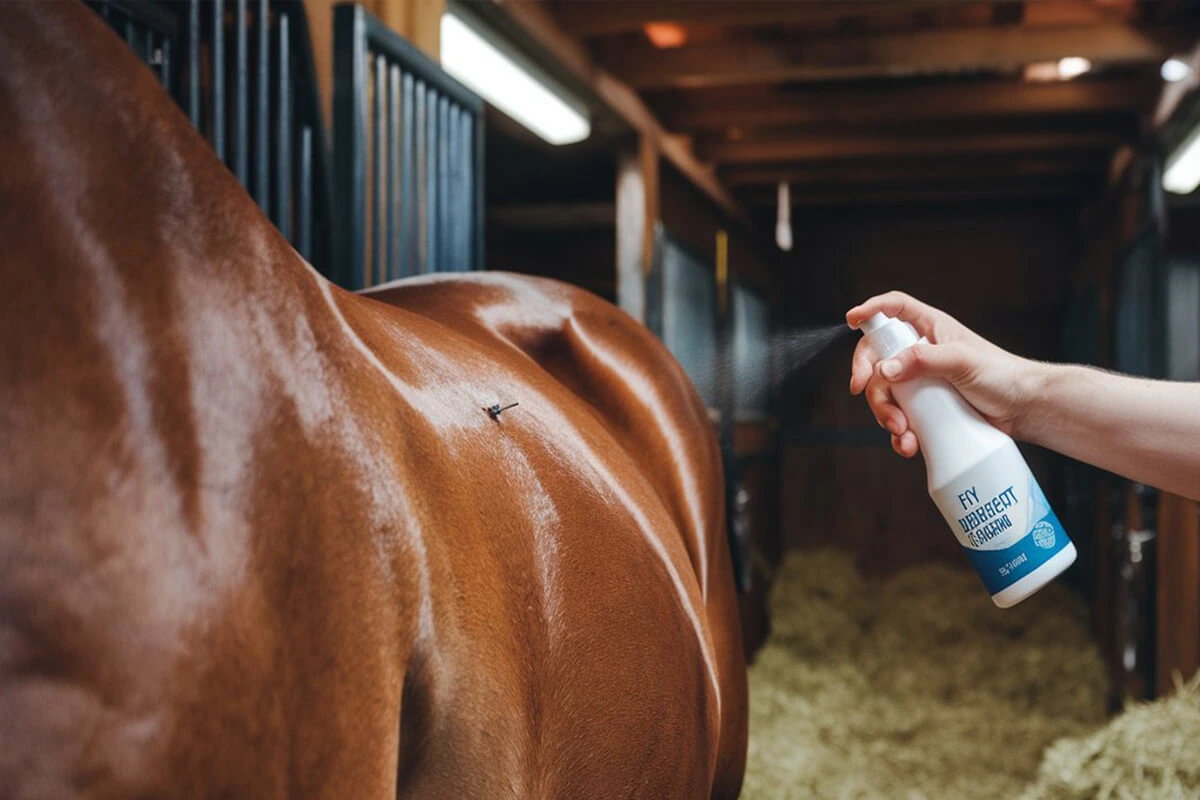Horse flies are more than just a nuisance—they are relentless, aggressive biters that can make life miserable for both humans and animals. If you’re tired of swatting them away, you’re probably wondering how to get rid of horse flies fast. These blood-sucking pests belong to the Tabanidae family and thrive in warm, humid environments, often near water sources like ponds, marshes, and livestock areas. Their painful bites can cause irritation, swelling, and even allergic reactions, making effective control essential.
Fortunately, you don’t have to suffer through a horse fly infestation. There are plenty of proven methods to eliminate them quickly and prevent them from coming back. Whether you prefer natural solutions like essential oil repellents and DIY fly traps or need a more aggressive approach using insecticides and commercial repellents, this guide will help you take action.
In this article, you’ll learn the best and easiest ways to stop horse flies from biting, disrupt their breeding grounds, and keep your environment pest-free. From homemade fly sprays to effective prevention strategies, we’ll cover everything you need to know to reclaim your outdoor space. Let’s dive in!
Understanding Horse Flies and Their Behavior
What Are Horse Flies?
Horse flies are large, blood-feeding insects that belong to the Tabanidae family. These aggressive pests stand out because of their powerful flight, razor-sharp mouthparts, and relentless biting behavior. Unlike common houseflies, horse flies don’t just hover around garbage or food—they actively seek out warm-blooded hosts, including horses, cattle, and even humans.
One of the biggest reasons people struggle to figure out how to get rid of horse flies is their persistence and adaptability. These insects can detect movement and body heat from a distance, making them highly effective hunters. Their large, colorful eyes give them excellent vision, allowing them to track their targets with precision. Female horse flies need blood meals to develop their eggs, which is why they bite so aggressively. In contrast, male horse flies feed on nectar and plant juices, so they don’t pose the same problem.
Why Are Horse Flies Such a Nuisance?
Horse flies are more than just annoying; their bites are painful and can lead to serious irritation. Unlike mosquitoes, which use a needle-like mouthpart to pierce the skin, horse flies cut into flesh with scissor-like mandibles. This results in a sharp, stinging bite that causes swelling, redness, and persistent itching. Their bites can also lead to secondary infections if not treated properly.
For livestock owners, getting rid of horse flies is a top priority because these pests can stress animals, reduce milk production in dairy cows, and even lead to weight loss in horses and cattle. Horse flies also spread diseases like equine infectious anemia, making their presence a serious concern for farms and stables. Since they are most active during hot summer months, their impact can be relentless, especially in areas with abundant water sources and livestock.
Where Do Horse Flies Breed?
Understanding where horse flies breed is the first step in learning how to get rid of horse flies effectively. Unlike houseflies that lay eggs in rotting organic matter, horse flies prefer moist environments near water sources. Marshes, ponds, swamps, and even damp soil around barns create the perfect breeding grounds. Female horse flies lay their eggs on vegetation near water, where the larvae hatch and burrow into the damp ground. These larvae feed on organic matter and small insects before pupating and emerging as adults.
Because horse flies require water-rich environments to complete their life cycle, reducing standing water and maintaining dry, clean surroundings can significantly cut down on their numbers. Stagnant ponds, clogged gutters, and wet manure piles are prime locations for horse fly larvae to develop. Eliminating these breeding grounds is one of the most effective ways to control an infestation and prevent these biting insects from multiplying.
The Best Natural Methods to Repel Horse Flies
Essential Oils for Horse Fly Repellent
If you want a natural way to keep these biting pests away, essential oils work as an excellent horse fly repellent. Many people searching for how to get rid of horse flies prefer natural alternatives over chemical insecticides, especially when dealing with horses, livestock, or pets. Essential oils not only repel horse flies but also create a pleasant-smelling barrier against other annoying insects like mosquitoes and gnats.
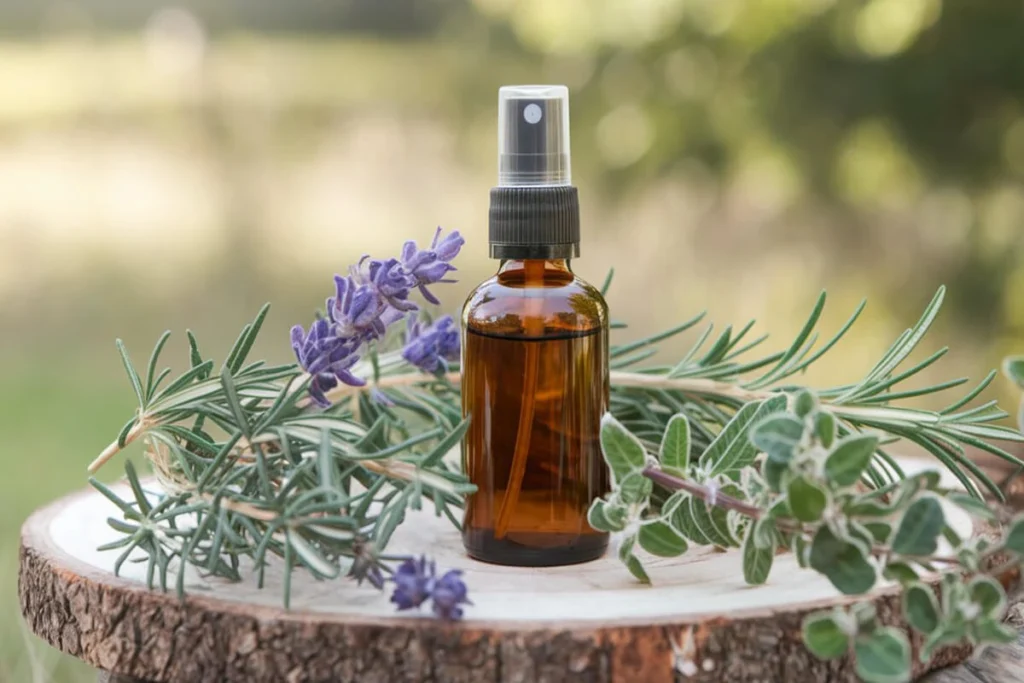
Some of the most effective essential oils for horse fly repellent include:
- Citronella Oil: One of the most well-known natural fly repellents, citronella oil masks the scents that attract horse flies. It’s a key ingredient in many commercial fly sprays.
- Eucalyptus Oil: This strong-smelling oil contains compounds that deter horse flies while also providing antibacterial benefits to soothe insect bites.
- Lavender Oil: Known for its calming scent, lavender oil repels horse flies and helps reduce inflammation if a bite occurs.
- Peppermint Oil: The strong menthol aroma of peppermint disrupts a horse fly’s ability to detect its target, making it an effective natural deterrent.
- Tea Tree Oil: This oil has insect-repelling properties and can also prevent infections from horse fly bites.
To use essential oils effectively, mix a few drops with water or carrier oils like coconut or olive oil. Apply the mixture to your skin, animals, or outdoor surfaces where horse flies are a problem. For extra protection, combine multiple oils in a homemade spray for long-lasting results.
Homemade Fly Spray Recipes
If you want an affordable and effective way to get rid of horse flies fast, making your own homemade fly spray is a great option. Store-bought repellents can contain harsh chemicals, but DIY fly sprays use natural ingredients that are safe for humans and animals.
Here are a few easy and proven homemade fly spray recipes:
1. Essential Oil Fly Spray
- 2 cups of water
- 10 drops of citronella oil
- 10 drops of eucalyptus oil
- 5 drops of peppermint oil
- 1 tablespoon of apple cider vinegar
- 1 teaspoon of dish soap (helps the mixture stick to surfaces)
Put all the ingredients into a spray bottle. Close the bottle and shake it well before using. Spray directly on horses, livestock, or outdoor areas where horse flies gather.
2. Vinegar and Lemon Fly Spray
- 1 cup of apple cider vinegar
- 1 cup of water
- Juice from one lemon
- 1 tablespoon of witch hazel
- 5 drops of tea tree oil
Combine the ingredients in a spray bottle and apply it to exposed skin, animal fur, or barn walls. The acidic scent of vinegar repels horse flies, while lemon and tea tree oil provide additional protection.
3. Garlic and Neem Oil Fly Spray
- 2 cloves of crushed garlic (steeped in hot water for 30 minutes)
- 1 cup of water
- 10 drops of neem oil
- 1 teaspoon of dish soap
Once the garlic-infused water cools, mix in the neem oil and dish soap. Neem oil is a natural insecticide that disrupts horse flies’ feeding and breeding cycles, making this spray highly effective.
Use any of these homemade fly sprays regularly to prevent horse fly infestations and reduce their numbers around your property.
Plants That Repel Horse Flies
If you’re looking for a long-term way to prevent horse flies, planting natural repellents around your property is a smart strategy. Certain plants give off strong scents that horse flies hate, making them excellent additions to gardens, barns, and outdoor areas.
Here are some of the best plants to repel horse flies:
- Lavender: This fragrant herb repels horse flies while also attracting pollinators like bees and butterflies. It grows well in sunny places and needs very little care.
- Basil: The strong aroma of basil confuses horse flies, making it harder for them to locate their targets. Plant it in pots near entryways or in your garden for added protection.
- Marigolds: These vibrant flowers release a scent that repels horse flies, mosquitoes, and other pests. Plant them around patios, barns, and stables for natural fly control.
- Peppermint: Horse flies dislike the intense minty smell of peppermint. Growing peppermint around water sources, fences, and doors can help keep these pests away.
- Rosemary: This hardy herb doubles as a natural fly repellent while adding a pleasant aroma to your surroundings. It grows well in pots or garden beds.
For the best results, plant a combination of these fly-repelling herbs and flowers around your home, barn, or outdoor seating areas. When paired with homemade fly sprays and other preventive measures, these plants offer a natural and effective way to get rid of horse flies.
Effective Horse Fly Traps and Barriers
DIY Horse Fly Traps
If you’re looking for how to get rid of horse flies without using chemicals, DIY horse fly traps are one of the most effective solutions. These traps work by attracting and capturing horse flies, reducing their numbers around your home, barn, or outdoor space. Making your own horse fly trap is easy and inexpensive, and you can use common household items to create one.
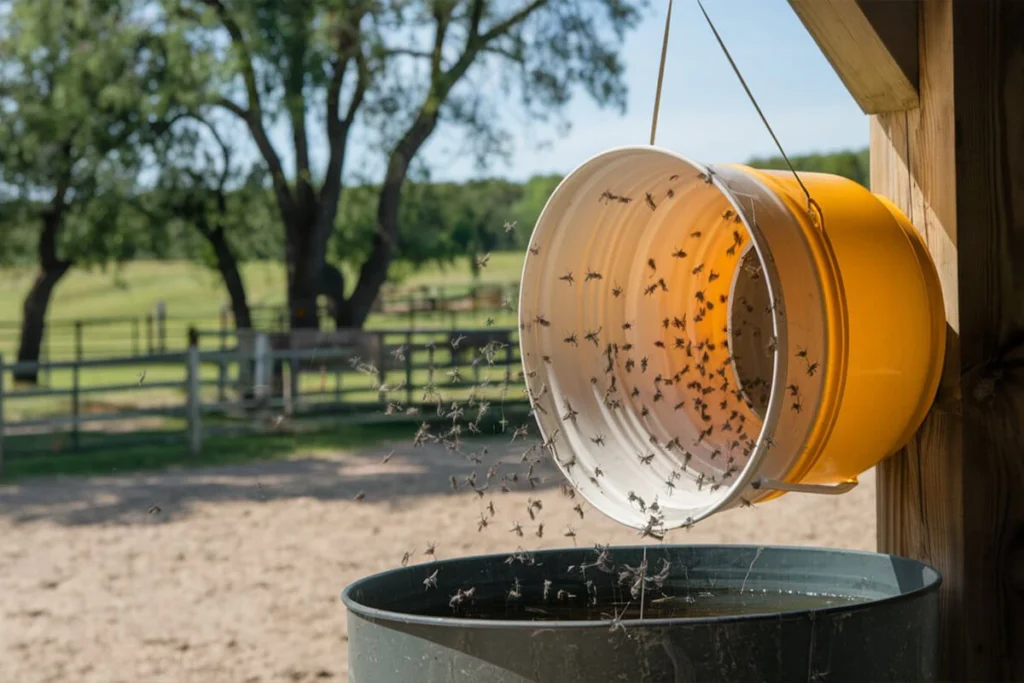
1. Bottle Trap
This simple DIY horse fly trap uses a plastic bottle to lure and trap flies.
What You’ll Need:
- A large plastic bottle (2-liter soda bottle works best)
- Sugar water or apple cider vinegar (to attract the flies)
- Dish soap (breaks the surface tension, making it harder for flies to escape)
- A sharp knife or scissors
How to Make It:
- Take a plastic bottle and cut off the top part. You only need to remove the upper third of the bottle.
- Flip the cut-off top upside down and place it inside the bottom half of the bottle, creating a funnel.
- Secure the edges with tape or glue.
- Fill the bottom of the bottle with sugar water, apple cider vinegar, and a few drops of dish soap.
- Place the trap near horse fly-infested areas like barns, patios, or livestock shelters.
Horse flies will be drawn to the sweet liquid, fall inside the funnel, and drown in the soapy water.
2. Sticky Ball Trap
Horse flies are highly attracted to moving objects, especially dark-colored ones. This DIY trap uses that instinct against them.
What You’ll Need:
- A large black ball (yoga or beach ball)
- String or a pole to hang it from
- Strong sticky flypaper or Tanglefoot adhesive
How to Make It:
- Hang the black ball from a tree branch or barn ceiling, about 3-4 feet off the ground.
- Apply a generous layer of sticky flypaper or Tanglefoot adhesive to the ball.
- As horse flies try to land on the ball, they’ll get stuck and be unable to escape.
This method is highly effective near livestock areas or outdoor spaces where horse flies are a problem.
Best Commercial Fly Traps
If you want to get rid of horse flies fast without the hassle of DIY traps, commercial fly traps offer a powerful solution. These ready-made traps are designed specifically for catching and killing horse flies, and they can be placed around your property for continuous protection.
Here are some of the best commercial horse fly traps:
1. Bite-Lite H-Trap
- One of the most effective commercial horse fly traps on the market
- Uses a dark-colored bait ball and sticky capture system
- Covers a large area and works well for farms, barns, and stables
2. Flies Be Gone Trap
- Uses non-toxic bait to lure and capture horse flies
- Works well in outdoor areas, especially near water sources
- Lasts for weeks before needing replacement
3. Rescue Big Bag Fly Trap
- Attracts and kills a wide range of biting flies, including horse flies
- Easy to hang near barns, patios, or livestock shelters
- Uses a strong lure that horse flies find irresistible
4. Farnam Trap-N-Toss Disposable Fly Trap
- Pre-baited and ready to use
- Perfect for hanging in barns, near stalls, and around livestock areas
- Disposable design makes cleanup easy
Commercial traps can significantly reduce horse fly populations, especially when combined with DIY methods and other preventive measures.
Using Screens, Nets, and Physical Barriers
Horse flies are strong fliers, but they are not very skilled at navigating barriers. Using physical barriers like screens, nets, and protective coverings is one of the best ways to prevent horse flies from entering your space and biting humans or animals.
1. Fly Screens for Doors and Windows
- Installing fine-mesh fly screens on doors and windows prevents horse flies from entering your home, barn, or stable.
- Make sure the mesh is small enough to block horse flies while still allowing ventilation.
- Magnetic or self-closing screens work well for frequently used doors.
2. Fly Nets for Horses and Livestock
- Horses and cattle are common targets for horse flies, so protective fly nets and masks help shield them from painful bites.
- Look for fly sheets, masks, and leg wraps made from breathable, lightweight materials.
- Consider using fly boots for horses to protect their lower legs, where horse flies frequently bite.
3. Outdoor Netting and Curtains
- Hanging mesh curtains around outdoor seating areas, barns, and patios creates a barrier against horse flies.
- Use lightweight, UV-resistant netting that allows airflow while keeping pests out.
- Combine netting with fans, since horse flies struggle to fly against strong airflow.
4. Fans and Air Circulation
- Horse flies are weak fliers compared to houseflies, so setting up fans in barns, stables, and patios can prevent them from landing on animals or people.
- Large barn fans help keep airflow strong and discourage horse flies from lingering in enclosed areas.
By combining screens, nets, and physical barriers with traps and repellents, you can create a comprehensive defense against horse flies. Whether you’re dealing with a small infestation or a larger problem, these methods will help you get rid of horse flies fast and keep them from coming back.
Insecticides & Chemical Repellents for Horse Flies
Best Horse Fly Sprays and Repellents
If you want to get rid of horse flies fast, using an effective fly spray or repellent is one of the best options. Horse flies are relentless biters, and their painful bites can cause irritation, allergic reactions, and even infections. A good horse fly spray helps create a protective barrier, keeping these pests away from you, your animals, and your outdoor space.
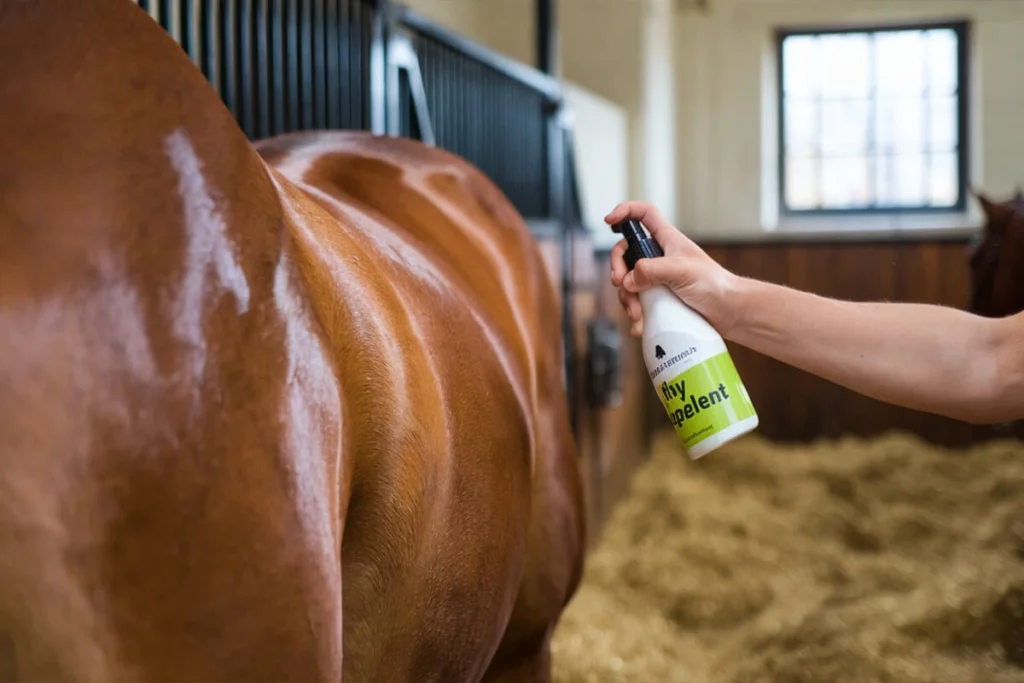
Here are some of the best horse fly sprays and repellents available:
1. Farnam Endure Sweat-Resistant Fly Spray
- One of the most popular and long-lasting horse fly sprays on the market.
- Contains permethrin and cypermethrin, which kill and repel horse flies.
- Sweat-resistant formula stays effective even in hot and humid weather.
2. Absorbine UltraShield EX Fly Spray
- Provides up to 17 days of protection against horse flies.
- Works on horses, dogs, and livestock.
- Contains DEET and permethrin for strong fly repellent action.
3. Pyranha Wipe N’ Spray Fly Repellent
- Oil-based formula that repels horse flies while conditioning the coat.
- Includes pyrethrins to kill flies on contact.
- Works well for horses and livestock but may not be ideal for sensitive skin.
4. Espree Aloe Herbal Horse Fly Spray (Best Natural Option)
- Made with essential oils like citronella and eucalyptus.
- Free from harsh chemicals, making it safer for sensitive animals.
- Provides moderate protection but may need more frequent reapplication.
When choosing a horse fly spray, consider the level of infestation, how long you need protection, and whether you prefer a natural or chemical-based formula. Using fly sprays consistently helps reduce bites and keeps horse flies from becoming a bigger problem.
How to Safely Apply Insecticides
Using insecticides can be an effective way to get rid of horse flies, but applying them incorrectly can harm humans, animals, and the environment. Whether you’re using a commercial spray, fogger, or granular treatment, following safety guidelines is crucial.
1. Choose the Right Insecticide
- For Direct Application on Animals: Look for sprays with permethrin, pyrethrins, or DEET, as these ingredients repel and kill horse flies.
- For Barns, Stables, and Outdoor Areas: Use residual insecticides like bifenthrin or cyfluthrin, which provide long-lasting control.
- For Water Sources: Apply larvicides like methoprene to prevent horse flies from breeding in standing water.
2. Wear Protective Gear
- Always wear gloves, long sleeves, and a mask when applying insecticides to avoid skin and respiratory irritation.
- Keep sprays away from the eyes, nose, and mouth of both humans and animals.
3. Apply at the Right Time
- Spray horses and livestock early in the morning or late in the evening when horse flies are most active.
- Avoid applying sprays in direct sunlight, as some chemicals can break down quickly or cause skin irritation.
4. Target Key Areas
- Focus on spraying the legs, belly, and ears of horses and livestock, as horse flies prefer biting these areas.
- When treating barns and outdoor spaces, spray along walls, doorways, and shaded areas where flies tend to rest.
5. Store Insecticides Properly
- Keep all insecticides in a cool, dry place away from children and animals.
- Never mix different insecticides unless the label specifically allows it, as some chemicals can react dangerously.
Properly applying insecticides can significantly reduce horse fly populations, but for long-term control, you should combine them with traps, repellents, and habitat management strategies.
Alternative Chemical-Free Solutions
If you want to get rid of horse flies without using chemicals, plenty of natural and non-toxic alternatives can keep these pests away. While chemical sprays are effective, many people prefer safer, eco-friendly options, especially when dealing with horses, pets, or sensitive individuals.
1. Essential Oil Fly Repellents
- Horse flies dislike the strong scents of citronella, eucalyptus, peppermint, lavender, and tea tree oil.
- Mix a few drops of essential oil with water and apple cider vinegar to create a homemade fly spray.
- Apply directly to skin, animals, or outdoor areas for natural fly control.
2. Vinegar and Garlic Repellent
- Horse flies hate the strong smell of vinegar and garlic, making it an effective deterrent.
- How to Use It: Add garlic powder or minced garlic to an animal’s feed, as it naturally repels flies from the inside out.
- For an external spray, mix equal parts apple cider vinegar and water, then apply it to exposed skin and fur.
3. Physical Barriers (Best for Horses & Livestock)
- Use fly sheets, masks, and leg wraps to prevent horse flies from landing and biting.
- Install mesh screens and fans in barns and stables to create a fly-free zone.
4. Predator Insects
- Introducing parasitic wasps (which prey on horse fly larvae) can naturally reduce their population.
- Birds like swallows and purple martins also feed on horse flies, so attracting them to your property can help control infestations.
5. Keep the Environment Clean
- Horse flies breed in moist areas near standing water, manure, and rotting organic matter.
- Eliminate breeding grounds by draining puddles, cleaning out water troughs regularly, and removing manure piles.
Using chemical-free methods may require more effort, but they provide a long-term, eco-friendly way to prevent horse flies while keeping animals and humans safe. Combining these strategies with fly traps, physical barriers, and good sanitation will give you the best chance at keeping these biting pests under control.
Conclusion
Horse flies are more than just a nuisance—they are aggressive biters that can cause discomfort, stress, and even health issues for humans and animals. If you want to get rid of horse flies fast, you need a combination of effective strategies, including repellents, traps, insecticides, and natural solutions. Simply swatting them away won’t solve the problem, but taking the right steps will significantly reduce their presence.
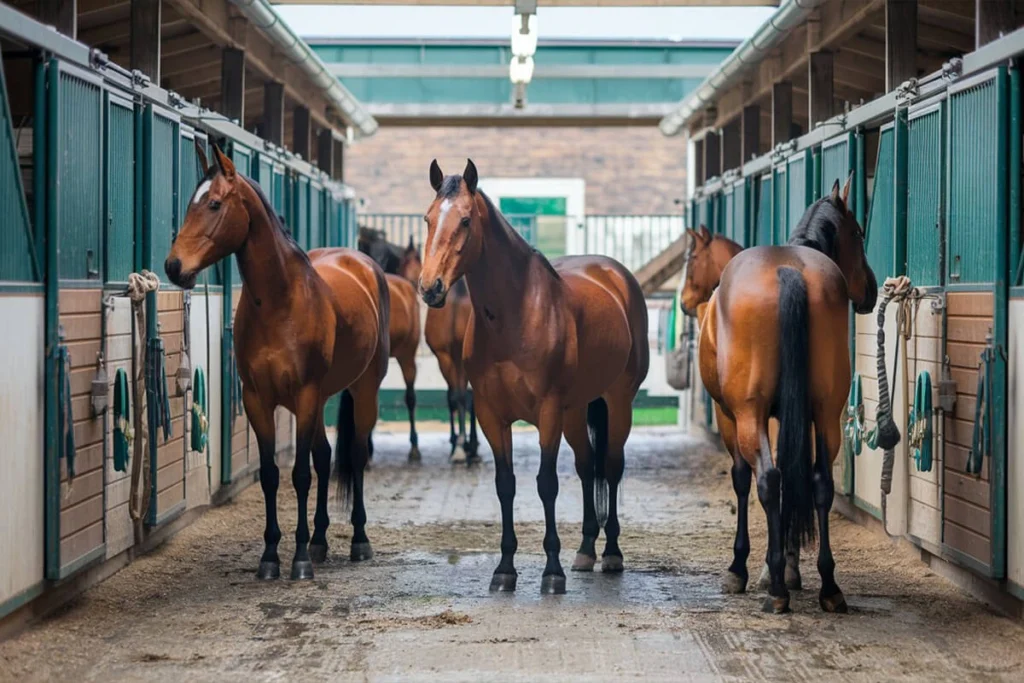
Using horse fly repellents, whether commercial sprays or homemade solutions with essential oils, helps protect your skin and animals from painful bites. DIY and commercial fly traps capture and kill horse flies before they can attack, making them an essential tool for controlling infestations. For long-term protection, applying insecticides properly in barns, stables, and outdoor areas reduces fly populations. If you prefer a chemical-free approach, solutions like fly nets, screens, and physical barriers can prevent horse flies from reaching their targets.
Since horse flies breed in water sources, eliminating standing water and keeping the environment clean is crucial for preventing horse fly infestations before they start. Combining these strategies will give you the best chance of keeping these biting pests under control.
If you’re dealing with an ongoing horse fly problem, don’t wait to take action. Implement these proven solutions today to enjoy a fly-free environment. By using the best fly repellents, setting up effective traps, and maintaining proper fly control practices, you can finally stop horse flies from biting and reclaim your outdoor space.
Read More About how to care for your Horse in this guide.
How to Ride like A pro, Full Guide here.
Learn More about Pets and Different breeds From HERE!
Find out the Latest stuff for your Pet On Pet MD Official
